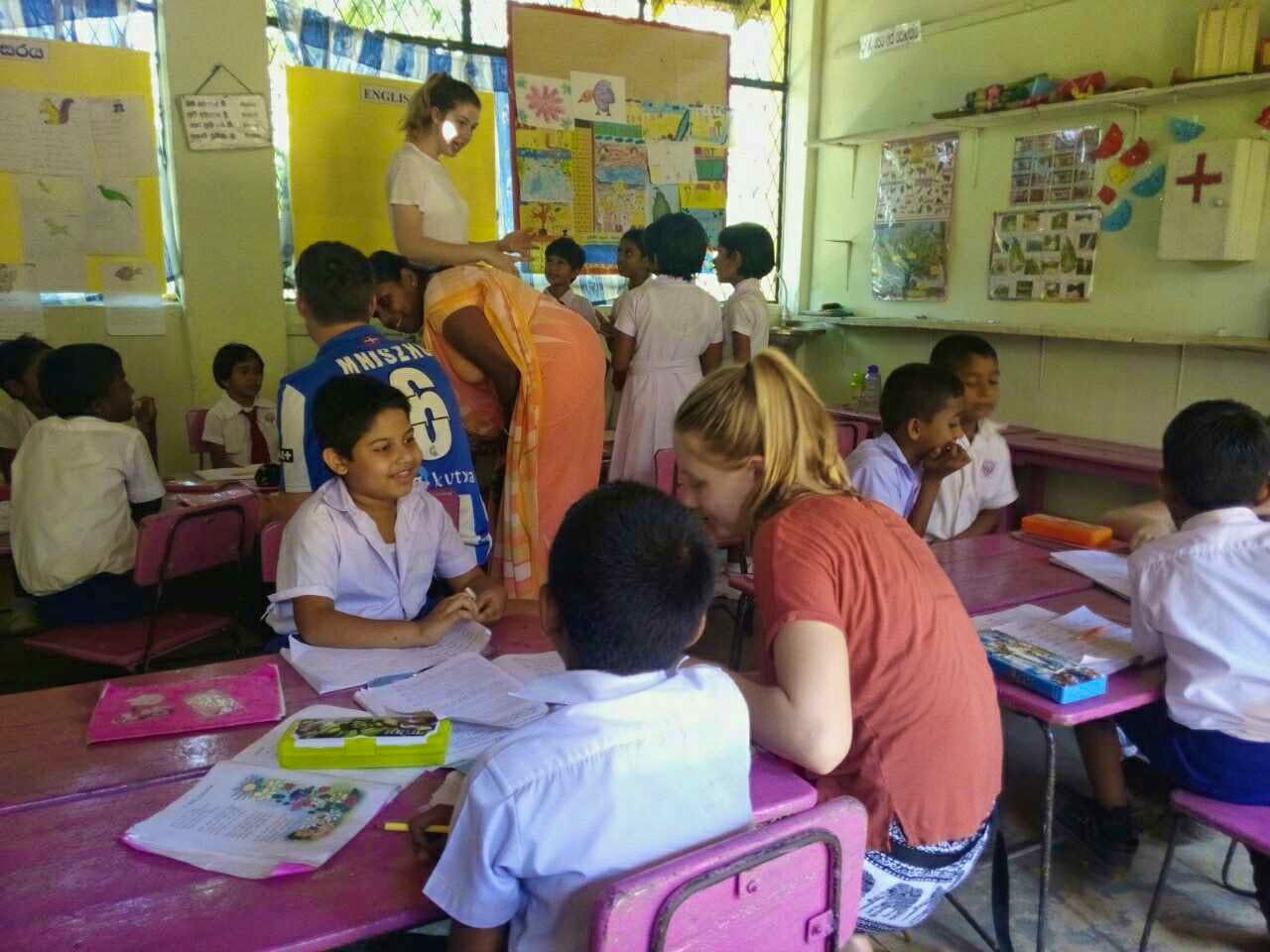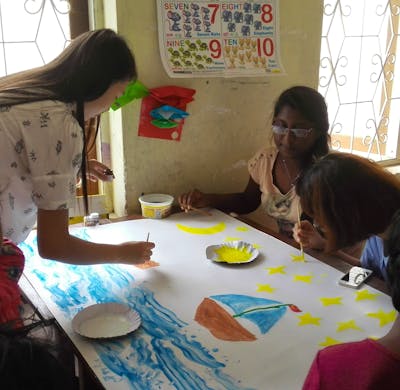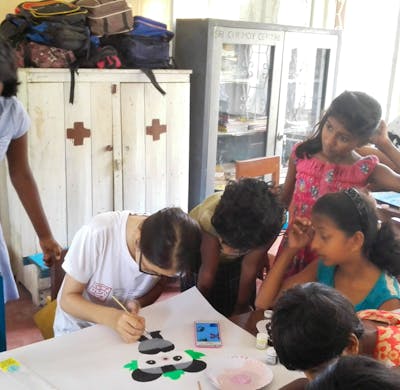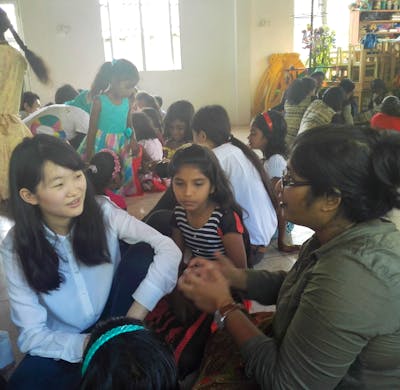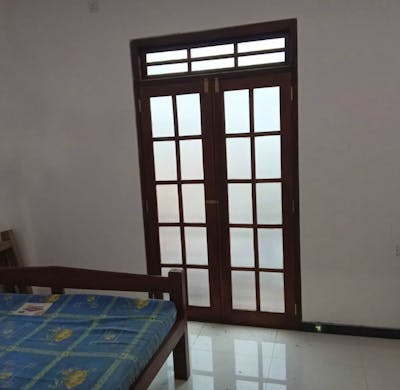Teaching in Sri Lankan schools provides a rewarding experience where educators play a crucial role in shaping students' development. Sri Lanka has a well-established education system, spanning primary to tertiary levels, with compulsory primary education and national examinations for higher education eligibility. Teachers work in diverse settings, including public, private, and international schools, with responsibilities ranging from instruction to extracurricular activities.
The curriculum is overseen by the Ministry of Education, covering subjects like Sinhala, Tamil, English, mathematics, science, and social studies. Teachers adapt to Sri Lanka's multilingual environment, with Sinhala, Tamil, and English as prominent languages. Classroom sizes vary, and creating an engaging learning environment is a key responsibility.
Cultural sensitivity is essential due to Sri Lanka's rich cultural diversity. Teachers foster respect for students' backgrounds and traditions. Extracurricular activities are encouraged for holistic development, though challenges like resource limitations and educational disparities exist.
Foreign teachers should be aware of visa and work authorization requirements, which vary by nationality and school type. Teaching in Sri Lanka offers a chance to make a meaningful impact on students' lives and contribute to the nation's educational progress.
Certainly, here are powerful points highlighting the importance of teaching programs in Sri Lanka:
- Education as a Foundation: Teaching programs serve as the foundation for individual and national progress, providing the knowledge and skills necessary for personal and economic development.
- Economic Empowerment: Education empowers individuals to secure better job opportunities, increasing their earning potential and contributing to economic growth and stability in Sri Lanka.
- Reducing Inequality: Teaching programs play a pivotal role in reducing disparities in educational access and outcomes, fostering social equality and inclusivity.
- Preservation of Culture: In Sri Lanka's rich multicultural landscape, teaching programs help preserve and celebrate cultural heritage, languages, and traditions, fostering cultural identity.
- Community Development: Education equips communities with the tools to address local challenges, stimulate economic development, and improve overall well-being.
- Global Competence: Through teaching programs, Sri Lankan students gain global competence, promoting cross-cultural understanding and preparing them for a connected world.
- Health and Well-Being: Education is linked to better health outcomes, as it promotes health awareness, hygiene practices, and access to healthcare services.
- Informed Citizenship: Teaching programs cultivate informed and responsible citizens, essential for a thriving democracy, civic engagement, and the exercise of individual rights.
- Human Capital Development: A well-educated workforce is a valuable asset, driving innovation, productivity, and competitiveness in the global market.
- Research and Innovation: Teaching programs nurture future researchers and innovators, contributing to scientific advancements, technological progress, and problem-solving.
- Social Cohesion: Education fosters social cohesion by promoting tolerance, empathy, and understanding among diverse groups, contributing to social harmony and peace-building.
- Nation-Building: Education is a cornerstone of nation-building, empowering individuals to contribute to the growth, development, and prosperity of Sri Lanka.
These powerful points underscore the multifaceted importance of teaching programs in Sri Lanka, touching on education's transformative impact on individuals, communities, and the nation as a whole.
Public education in Sri Lanka faces several social issues and challenges that affect students, teachers, and the education system as a whole. Some of the key social issues related to education in Sri Lanka include:
- Access to Quality Education: While Sri Lanka has a high literacy rate, disparities in access to quality education persist, particularly in rural and disadvantaged areas. Students in these regions may have limited access to well-equipped schools, qualified teachers, and educational resources.
- Inequality in Educational Opportunities: Socioeconomic disparities often result in unequal access to educational opportunities. Children from affluent families tend to have better access to private tutoring and extracurricular activities, which can widen the educational achievement gap.
- Gender Disparities: Gender-based disparities in education persist, with girls often facing challenges related to cultural norms, early marriage, and limited access to higher education. Efforts have been made to address these issues, but gender equality in education remains a concern.
- Access to Higher Education: Limited access to higher education institutions, particularly in fields like medicine and engineering, can be a barrier for many students. High competition for limited slots in prestigious universities can be a source of stress and inequality.
- Quality of Education: Ensuring a consistently high quality of education across all schools and regions is a challenge. Some schools may lack well-trained teachers, proper infrastructure, and up-to-date curriculum materials.
- Teacher Shortages: Sri Lanka has faced shortages of qualified teachers, especially in subjects like science and mathematics. Attracting and retaining skilled educators is crucial for improving the quality of education.
- Standardized Testing Pressure: The emphasis on standardized testing, such as the GCE Ordinary Level and Advanced Level examinations, can create immense pressure on students. This pressure can lead to a narrow focus on exam preparation rather than holistic learning.
- Access to Educational Technology: The digital divide can limit students' access to educational technology and online resources, particularly in rural areas with limited internet connectivity and computer access.
- Language Barriers: Sri Lanka's multilingual environment can pose challenges for students who speak languages other than Sinhala or Tamil. Access to quality education in their native language can be limited.
- School Infrastructure and Safety: Adequate school infrastructure and safety measures are essential for a conducive learning environment. Some schools may lack proper facilities and face safety concerns.
- Student Well-Being: Addressing the holistic well-being of students, including mental health and emotional support, is increasingly recognized as important. Pressures related to exams and social expectations can impact students' mental health.
- Inclusive Education: Ensuring that students with disabilities have equal access to education and appropriate support services is an ongoing challenge. There is a need for greater inclusivity and accommodations for diverse learning needs.
Sri Lanka has made significant strides in improving its education system, including achieving high literacy rates and expanding access to education. However, addressing these social issues is essential to ensure equitable access to quality education for all Sri Lankan students and to foster the country's future development and prosperity. Efforts by the government, civil society organizations, and the international community are ongoing to address these challenges and promote inclusive and high-quality education in Sri Lanka.
Addressing the social issues related to education in Sri Lanka involves a collaborative effort from various stakeholders, including the government, civil society organizations, educators, and the public. Here are some of the ways in which these groups work to solve these challenges:
- Government Initiatives: The Sri Lankan government has implemented a range of initiatives to improve education. These include building new schools, upgrading existing infrastructure, providing financial assistance to low-income families, and recruiting and training teachers.
- Scholarship Programs: To address inequality in educational opportunities, scholarship programs are available to economically disadvantaged students. These scholarships may cover tuition fees, textbooks, and other educational expenses.
- Teacher Training: The government invests in teacher training programs to enhance the quality of education. This includes providing professional development opportunities for teachers and hiring more qualified educators.
- Gender Equality: Efforts to promote gender equality in education include awareness campaigns to challenge stereotypes and encourage girls' education. Policies are also in place to provide equal opportunities for both genders.
- Inclusive Education: Sri Lanka has taken steps to make education more inclusive by providing accommodations for students with disabilities. This includes accessible facilities, specialized teaching methods, and support services.
- Curriculum Development: Curriculum reform aims to provide a more holistic and student-centered approach to education. This includes revising textbooks and teaching materials to ensure relevance and inclusivity.
- Community Involvement: Local communities often play a role in improving schools. Parent-teacher associations and community-based organizations can advocate for better resources and contribute to school improvement projects.
- NGO and Civil Society Engagement: Non-governmental organizations (NGOs) and civil society organizations are actively involved in education initiatives. They provide additional resources, support teacher training, and work on specific issues, such as girls' education.
- Technology Integration: Efforts are made to integrate technology into education, particularly in urban areas. This includes providing students with access to computers and the internet for online learning.
- Mental Health Support: Recognizing the importance of student well-being, schools and organizations provide counseling and support services to address mental health challenges and academic stress.
- Advocacy and Awareness: Activists and advocates work to raise awareness about education-related issues, including the need for better resources, equitable access, and inclusive education.
- Public Engagement: The public plays a role by staying informed about education issues, participating in community discussions, and supporting initiatives that promote quality education for all.
- International Support: Sri Lanka receives support from international organizations and donor agencies that provide funding, technical assistance, and expertise to improve education.
Addressing the social issues related to education in Sri Lanka is an ongoing process that requires collaboration and sustained efforts from all sectors of society. While progress has been made, continued advocacy, policy development, and investment in education are essential to ensure that every child has access to a quality education and can reach their full potential.
Teaching in Sri Lanka refers to the practice of educators, both local and foreign, providing instruction and guidance to students within the Sri Lankan education system. This educational endeavor encompasses a wide range of responsibilities, challenges, and opportunities. Here is an overview of what teaching in Sri Lanka entails:
- Educational Levels: Teaching in Sri Lanka covers various educational levels, from primary to secondary and higher education. Educators work with students of different ages and backgrounds.
- Subjects and Specializations: Teachers instruct students in various subjects, including mathematics, science, languages (Sinhala, Tamil, English), social studies, and more. Some educators may have specialized expertise in certain subjects or fields.
- Classroom Instruction: The core of teaching involves classroom instruction, where teachers deliver lessons, facilitate discussions, and engage students in learning activities. They aim to impart knowledge, critical thinking skills, and a passion for learning.
- Curriculum and Lesson Planning: Teachers follow the national curriculum guidelines set by the Ministry of Education. They plan lessons, develop teaching materials, and align their instruction with curriculum objectives.
- Multilingual Environment: Sri Lanka's multilingual environment necessitates teaching in Sinhala, Tamil, or English, depending on the region and institution. Teachers may need to adapt to language preferences and fluency levels.
- Classroom Management: Effective classroom management involves maintaining a conducive learning environment, managing student behavior, and fostering positive interactions among students.
- Extracurricular Activities: Many educators actively participate in extracurricular activities such as sports coaching, arts, and cultural events, contributing to students' holistic development.
- Exam Preparation: Students in Sri Lanka often prepare for standardized exams, such as the GCE Ordinary Level and Advanced Level examinations. Teachers play a critical role in preparing students for these assessments.
- Cultural Sensitivity: Teachers should be culturally sensitive, respecting the diverse backgrounds and traditions of their students. Cultural understanding contributes to a harmonious classroom atmosphere.
- Educational Challenges: Educators may encounter challenges such as resource limitations, varying levels of student proficiency, and disparities in educational access between urban and rural areas.
- Teacher Development: Continuous professional development is encouraged, with teachers attending workshops, training programs, and conferences to enhance their teaching skills and stay updated with best practices.
Impact on Students: Teaching in Sri Lanka provides an opportunity for educators to make a meaningful impact on students' lives by equipping them with the knowledge and skills needed for personal and professional success.
Foreign teachers interested in teaching in Sri Lanka may explore opportunities in public schools, private institutions, or international schools, depending on their qualifications and preferences. Teaching in Sri Lanka offers a chance to experience its rich culture, contribute to education, and engage with diverse students in a multicultural setting.
Here's a concise list of the roles and responsibilities of volunteers in Sri Lankan teaching programs:
- Assist in classroom instruction.
- Provide language support and practice.
- Support extracurricular activities.
- Mentor and guide students.
- Assist with special needs education.
- Contribute to resource development.
- Engage with the local community.
- Facilitate cultural exchange.
- Assess and evaluate student progress.
- Promote health and well-being.
- Participate in professional development.
- Maintain flexibility and adaptability.
Volunteers should collaborate closely with teachers and school administration to meet program needs effectively.
Location : Wattala
The city of Wattala situated in the western coastal region of Sri Lanka, presents a complex environment characterized by a mix of challenges and opportunities that shape its socio-economic landscape. These challenges provide a unique context for volunteering activities aimed at addressing and mitigating the issues faced by the
community:
Urban and Slum Areas: Wattalas urban fabric is interwoven with slum areas marked by inadequate infrastructure, limited access to basic services, and substandard living conditions. These conditions often lead to heightened vulnerabilities and inequalities among the population.
Poverty-Stricken Areas: Poverty is pervasive in various pockets of the city, limiting families' access to fundamental resources such as education, healthcare, and proper nutrition. Economic disparities contribute to a cycle of disadvantage.
Social Issues: The presence of poverty is closely linked to broader social issues, including limited employment opportunities, lack of access to quality education, and inadequate healthcare services. These issues further perpetuate socio-economic inequalities.
Substance Abuse and Addiction: Wattala grapples with a significant prevalence of adults addicted to alcohol and drugs. This not only results in family instability and neglect but also contributes to the perpetuation of the cycle of poverty and social disintegration.
Illegal Activities: Some community members are engaged in illegal activities such as smuggling and drug-related businesses. These activities not only foster social instability but also contribute to economic disparities within the city.
Educational Challenges: The lack of education among parents and adults in these areas serves as a barrier to proper education for children. The absence of educational foundations limits children's future prospects and perpetuates intergenerational poverty.
In summary, Wattala complex challenges provide a meaningful context for volunteering activities that can create positive change. By addressing educational gaps, promoting awareness, fostering positive role models, and contributing to community development, volunteers have the potential to alleviate some of the burdens faced by the city vulnerable populations.
Volunteers in Sri Lankan teaching programs typically work alongside various individuals and groups within the school and community. Here are the key stakeholders and groups with whom volunteers may collaborate:
- Classroom Teachers: Volunteers often work closely with classroom teachers, assisting them in delivering lessons, providing support to students, and aligning their efforts with the curriculum.
- Students: The primary beneficiaries of the volunteer's work are the students. Volunteers interact with and support students of different ages, backgrounds, and abilities.
- School Administrators: School principals and administrators oversee the school's operations and may coordinate the volunteer program. Volunteers may collaborate with them on various initiatives.
- Local Community: Volunteers may engage with the local community to promote education and community involvement. This could involve interacting with parents, community leaders, and local organizations.
- Other Volunteers: In some cases, volunteers may work with other volunteers, both local and international, who are part of the same teaching program or initiative.
- Special Education Teams: If a volunteer is involved in special education or assisting students with disabilities, they may collaborate with special education teachers and support staff.
- Mentorship Programs: Volunteers engaged in mentorship programs may work with designated mentors or coordinators who oversee the mentorship initiatives.
- Program Coordinators: Some teaching programs have designated program coordinators or supervisors who manage volunteer activities and provide guidance and support.
The specific individuals and groups with whom a volunteer collaborates can vary depending on the nature of the teaching program and the school's needs. Effective communication and collaboration with all stakeholders are essential to ensuring the success of the volunteer's efforts in the Sri Lankan educational context.
From volunteers in a teaching program in Sri Lanka, you can expect a range of contributions and qualities that enhance the educational experience for students and the school community. Here are some of the expectations from volunteers:
- Dedication: Volunteers are expected to be committed to their roles and the well-being of the students they work with.
- Support in Education: Volunteers should assist in classroom instruction, provide academic support, and help students improve their skills in various subjects.
- Cultural Sensitivity: Volunteers should respect and embrace the cultural diversity of Sri Lanka, fostering a harmonious environment in the classroom.
- Flexibility: Volunteers should be adaptable and willing to assist with various tasks and needs as they arise in the school.
- Mentoring and Guidance: Volunteers may be expected to mentor and provide guidance to students, helping them set and achieve educational and personal goals.
- Extracurricular Engagement: Encouraging students to participate in extracurricular activities, such as sports or arts, is an important role for volunteers.
- Language Support: Volunteers with language proficiency, particularly in English, can assist students in language skills and conversation practice.
- Resource Development: Volunteers may contribute to resource development by creating teaching materials and enhancing the learning environment.
- Community Engagement: Engaging with the local community and parents to promote the importance of education is often part of a volunteer's role.
- Professionalism: Volunteers are expected to maintain professionalism, including punctuality, reliability, and effective communication with teachers, students, and administrators.
- Positive Role Modeling: Volunteers should serve as positive role models for students, exemplifying qualities such as respect, responsibility, and a passion for learning.
- Feedback and Reflection: Volunteers may be expected to provide feedback on their experiences and reflect on their teaching practices to improve their impact over time.
- Commitment to Learning: A commitment to their own learning and professional development is valuable for volunteers, as it can lead to continuous improvement in their roles.
- Safety and Well-Being: Ensuring the safety and well-being of students is of utmost importance, and volunteers should adhere to school policies and guidelines.
Volunteers in a teaching program in Sri Lanka can expect certain forms of support, guidance, and resources from the program organizers, school administrators, and the local community. Here's what volunteers can typically expect:
- Orientation and Training: Volunteers can expect an orientation program that introduces them to the local culture, educational system, and program expectations. Training sessions may be provided to enhance their teaching skills and cultural sensitivity.
- Clear Roles and Responsibilities: Program organizers should provide volunteers with a clear understanding of their roles and responsibilities, including their teaching assignments, working hours, and any extracurricular activities they are expected to participate in.
- Supportive Environment: Volunteers can expect a supportive and welcoming environment within the school and local community. School administrators and teachers should be available to offer guidance and assistance.
- Cultural Immersion: Volunteers may have opportunities for cultural immersion experiences, such as visits to local landmarks, festivals, and community events, allowing them to better understand Sri Lankan culture.
- Resource Access: Volunteers should have access to necessary teaching materials and resources, which may include textbooks, classroom supplies, and educational tools.
- Accommodation and Meals: Depending on the program, volunteers may receive assistance in finding suitable accommodation and may have access to meals or meal stipends.
- Safety and Well-Being: Program organizers and school authorities are responsible for ensuring the safety and well-being of volunteers. This includes addressing any safety concerns and providing information about local health facilities.
- Professional Development: Opportunities for professional development, workshops, and training sessions may be offered to help volunteers improve their teaching skills and effectiveness.
- Community Integration: Volunteers can expect assistance in integrating into the local community and building connections with fellow educators, students, and community members.
- Feedback and Evaluation: Feedback mechanisms may be in place for volunteers to provide input on their experiences and suggest improvements to the program. Periodic evaluations may also be conducted to assess their progress.
- Cultural Exchange: Volunteers may have the chance to engage in cultural exchange activities, sharing their own culture and experiences with local students and community members.
- Local Support: Access to local support, such as a program coordinator or liaison, who can address any concerns or questions during their stay.
- Visa and Legal Support: If applicable, assistance with visa applications and legal requirements may be provided to ensure volunteers have the necessary documentation for their stay.
- Program Duration: Volunteers should receive clear information about the duration of their program, including start and end dates, so they can plan their stay accordingly.
It's essential for program organizers and school authorities to communicate these expectations and forms of support to volunteers before their arrival to ensure a positive and successful volunteer experience in Sri Lanka.
The specific equipment and materials that volunteers need to bring may vary depending on the teaching program, school, and the resources available locally. It's advisable for volunteers to communicate with the program organizers or coordinators to understand what is already provided and what they may need to bring. Here are some common considerations:
- Personal Teaching Materials: Some volunteers may prefer to bring teaching materials they are familiar with, such as textbooks, workbooks, or educational games, especially if they have expertise in a particular subject or teaching method.
- Teaching Aids: Depending on the teaching role, volunteers might consider bringing teaching aids like flashcards, posters, or visual aids to enhance classroom instruction.
- Laptop or Tablet: Having a personal laptop or tablet can be useful for lesson planning, creating teaching materials, and accessing online resources. However, check the availability of computer facilities at the school before deciding.
- Teaching Supplies: Basic classroom supplies like markers, pens, pencils, notebooks, and art supplies can be helpful, especially if the school has limited resources.
- Personal Teaching Resources: Volunteers with specialized skills or interests may want to bring materials related to their area of expertise, such as musical instruments or science experiment kits.
- Comfort Items: Personal comfort items like clothing, toiletries, and any medications should be packed according to personal preferences and needs.
It's crucial for volunteers to coordinate with program organizers to ensure that any materials they plan to bring align with the school's curriculum, teaching objectives, and the specific needs of the students. Additionally, volunteers should be mindful of luggage restrictions and customs regulations when bringing items into the country.
In many cases, schools and programs will provide basic teaching materials and resources, so volunteers may not need to bring extensive equipment. Clarifying expectations and available resources with the program organizers in advance will help volunteers prepare appropriately for their teaching assignment in Sri Lanka.
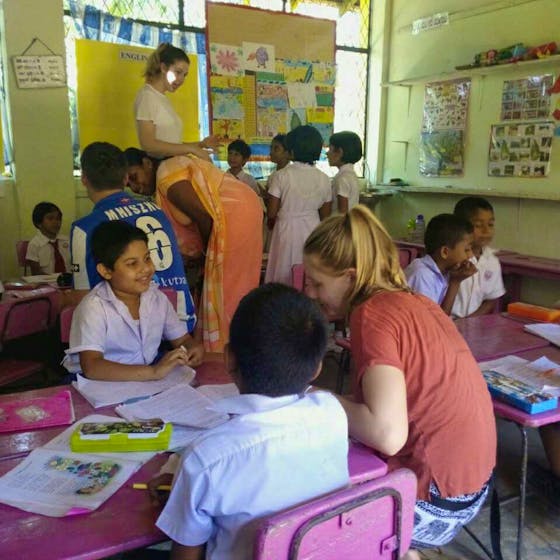
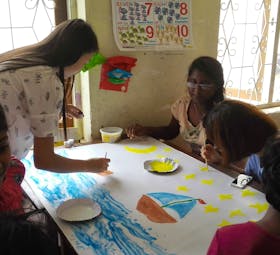
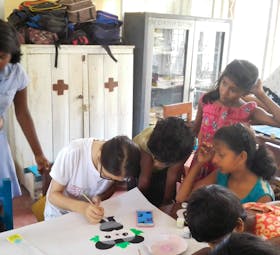
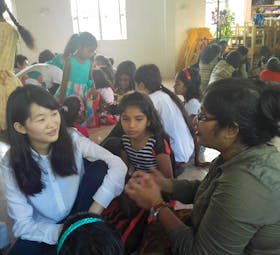


 4.3
4.3

